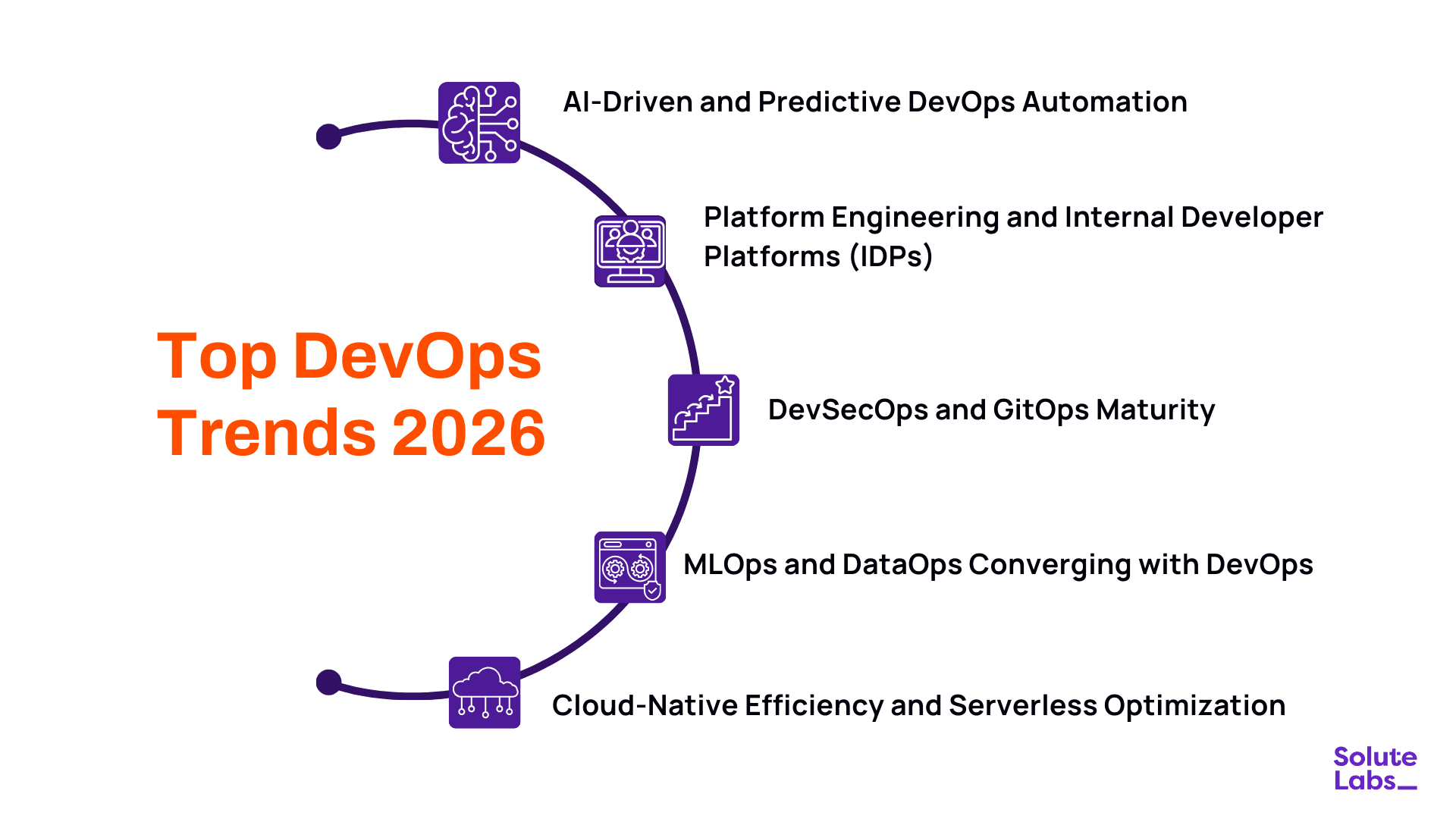By 2026, DevOps isn’t just about tools anymore. It’s a real driver for business growth.
For CEOs and tech leaders, the power of DevOps shows up in speed, how fast teams can ship, how safely platforms scale, and how reliably digital products support the bottom line. The best DevOps teams push code up to 208 times more often and bounce back from incidents 24 times faster than the rest. That means better uptime, smoother customer experiences, and stronger operations.
Almost 99% of companies see real benefits after moving to DevOps. We are talking up to 30% cuts in development and operations costs, according to Radixweb. In 2026, just having DevOps isn’t enough. The main distinguishing feature between organizations is the amount of centralized, automated, and integrated infrastructure their DevOps framework possesses.
Let’s explore the major DevOps trends projected to shape 2026 through the lens of what is truly important to business leaders: rapid scalability, ongoing agility, and the ability to grow without experiencing burnout.
Top DevOps Trends That Are Trending in 2026

1. AI-Driven and Predictive DevOps Automation
Automation is no longer just an old-school concept in DevOps but is entering its next evolution cycle.
For example, DevOps pipelines today provide warning signals that companies can act on to pause their release cycle before their systems go into crisis mode. In 2026, you won’t find businesses focused on modifying their infrastructure whenever they experience extreme spikes in site and application traffic because their systems are now able to identify multiple instances of those types of activities over time and scale their systems accordingly.
Consequently, DevOps 2026 professionals are utilizing data and machine learning to create a more efficient and effective way to ensure that their systems function as required.
2. Platform Engineering and Internal Developer Platforms (IDPs)
DevOps works well when teams are small. As companies grow, things start to fall apart.
Not because people are careless, but because every team solves the same problems differently. Different pipelines. Different environments. Different ways of deploying the same kind of service. Over time, this slows everyone down.
Platform engineering exists to fix that. Internal Developer Platforms give teams a shared foundation so they don’t have to rebuild the basics every time. Developers get standardized environments, pipelines, and workflows that just work.
The best IDPs don’t try to control developers. They remove friction:
- Teams can spin up what they need without waiting for approvals
- There’s a clear, supported way to do things
- Security and reliability are built in, not added later
Instead of relying on a few DevOps experts who know “how things work,” the platform itself becomes the source of truth. That consistency is what allows DevOps to scale without slowing everyone down.
3. DevSecOps and GitOps Maturity
Security delays don’t fly anymore. In 2026, if security blocks delivery, it’s treated as a system problem, not a people problem.
DevSecOps works when security rules are written once and enforced automatically. No debates. No last-minute reviews. Policies live as code and run every time something changes.
At the same time, GitOps has moved beyond theory. Git is no longer just where code lives. It’s where decisions are made. Every change is visible. Every rollback is traceable. Nothing slips through quietly.
Together, mature DevSecOps and GitOps setups mean:
- Automatic compliance verification for each code change
- Early detection of misconfigured systems
- Audit readiness without adversely affecting team productivity
This same philosophy of automation and data utilization, to create a predictable performance framework, will continue to gain traction with the growing number of organizations utilizing multiple cloud services. Organizations are using Git to manage their development and deployment processes, which allows them to manage complexity while maintaining control and flexibility in their workflows.
4. MLOps and DataOps Converging with DevOps
AI systems don’t behave like traditional software. Models change. Data shifts. Performance drifts over time. Treating AI like a normal application doesn’t work.
That’s why DevOps teams in 2026 are deeply involved in data and machine learning workflows. The lines between DevOps, MLOps, and DataOps are fading fast.
Teams now build pipelines that handle:
- Application code
- Data versions
- Model training and experimentation
Everything is tracked. Not just which version of code is running, but which data set was used and how the model was trained. Experiments don’t sit in notebooks forever. There’s a clear path to production.
When this alignment is missing, AI projects become hard to maintain and expensive to run. When it’s done right, AI becomes something teams can ship, monitor, and improve just like any other system.
5. Cloud-Native Efficiency and Serverless Optimization
Serverless isn’t new. What’s new is how seriously teams are treating efficiency.
In 2026, cloud-native architectures will be judged less by how modern they look and more by how little waste they produce. Teams want systems that scale when needed and stay quiet when they don’t.
Event-driven designs help with that. So does tighter DevOps discipline around deployments and monitoring. The goal isn’t complexity. It’s control.
Most teams are focused on:
- Keeping cloud costs predictable
- Removing unnecessary steps from deployment pipelines
- Spending less time managing infrastructure manually
Nobody cares about impressive diagrams anymore. What matters is whether your system runs lean, responds quickly, and doesn’t burn money in the background. If it does that, it’s doing its job.
Also Read: How Can DevOps Outsourcing Benefit Your Company?
Why DevOps Matters for Modern Software Teams?
DevOps isn’t just about moving fast. It’s about building systems that scale, recover quickly when something breaks, and handle change without turning everything upside down. When you nail DevOps, engineering gets smoother, and the whole business moves with a lot more confidence.
So, what’s in it for companies that really go all in on DevOps?
- Ship Features Faster: When workflows run on autopilot, and pipelines don’t jam up, code turns into features in no time. No more waiting around, teams push updates without missing a step.
- Lower Operational Risk: With standardized deployments and GitOps, every change leaves a trail. If something goes wrong, you just roll it back. No chaos, no late-night firefighting. Issues get fixed before they become big problems.
- Security Built In: DevSecOps bakes security right into the process. Teams release secure code, and they don’t have to slam on the brakes to do it.
- Higher Engineering Productivity: Developers aren’t bogged down wrestling with infrastructure. Thanks to platform engineering and self-service tools, they actually get to focus on building great stuff.
- Smarter Cost Control: Automated Enterprise DevOps and cloud-native tools make costs predictable and cut the waste. If you’re not using it, you’re not paying for it. No more surprise bills.
- Quicker Incident Recovery: With real-time monitoring and automated fixes, teams can recover from hiccups fast. Most customers never even notice anything happened.
- Real Visibility and Governance: Automated pipelines give leaders a live feed on progress. No more pestering people for updates or trying to micromanage every little thing.
Conclusion
In 2026, DevOps is about keeping things steady, even as everything gets bigger and more complicated. The teams that really lean into DevOps practices ship updates faster, recover from problems with less fuss, and roll with change, all without putting their systems at risk. That’s the real edge: creating delivery processes that hold up, no matter how much the business grows.
These days, DevOps means blending smart automation, secure pipelines, and platforms that can actually scale. When it all clicks, teams don’t waste time cleaning up after failures; they get to focus on the work that actually moves the business forward. That’s the difference between companies that thrive and those stuck putting out fires.
At SoluteLabs, we help companies build solid cloud and DevOps foundations, always with an eye on growth, security, and real efficiency. We don’t just deliver Cloud & DevOps services, we work alongside your team to create systems that help you scale, not slow you down. Want to see what your DevOps could look like at the next level? Get in touch with us today!
